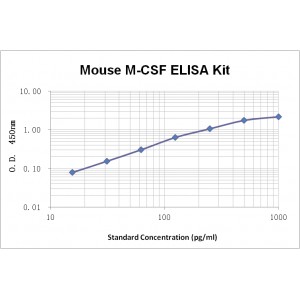More info
Assay Range | 15.6--1000 pg/mL |
Sensitivity | 1.0 pg/mL |
Specificity | No cross-reaction with other related substances detected |
Size | 96T |
Storage | Store at 2 - 8ºC. Keep reconstituted standard and detection Ab at -20 ºC |
Assay Principle | Sandwich ELISA |
Sample Volume | 100 µL final volume, dilution factor varies on samples |
Sample Type | serum, plasma or cell culture supernatant |
Detection Method | Chromogenic |
Kit Components
1. Recombinant Mouse M-CSF standard: 2 vials
2. One 96-well plate coated with Mouse M-CSF Ab
3. Sample diluent buffer: 12 mL - 1
4. Detection antibody: 130 µL, dilution 1:100
5. Streptavidin-HRP: 130 µL, dilution 1:100
6. Antibody diluent buffer: 12 mL x1
7. Streptavidin-HRP diluent buffer: 12 mL x1
8. TMB developing agent: 10 mL x1
9. Stop solution: 10 mL x1
10. Washing solution (20x): 25 mL x1
Background
Macrophage colony-stimulating factor (M-CSF) also known as, colony stimulating factor 1 (CSF1), is a secreted cytokine encoded by CSF1 gene in human. Full length mouse M-CSF is a 520 amino acid (aa) type I transmembrane protein that forms a 140 kDa covalent homodimer. Human M-CSF is active in the mouse, but mouse M-CSF appears to be species-specific. M-CSF is produced by many different cell types, including fibroblasts, activated macrophages, endometrial secretory epithelium, bone marrow stromal cells, vitamin D-stimulated osteoblasts, and activated endothelial cells.
M-CSF binds to its receptor M-CSF R (also called c-fms) to transduce its signals and mediate its endocytosis. Interaction of M-CSF dimers with M-CSF R induces receptor dimerization and phosphorylation at multiple sites. IL-34 can also interact with the M-CSF R, but activate distinct downstream pathways. M-CSF is essential to the survival, proliferation and differentiation of hematopoietic precursor cells, especially mononuclear phagocytes, such as macrophages and monocytes. It promotes the release of proinflammatory chemokines, and thereby plays an important role in innate immunity and in inflammatory processes. M-CSF plays an important role in the regulation of osteoclast proliferation and differentiation, the regulation of bone resorption, and in normal bone development.


